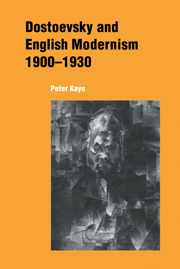Book contents
- Frontmatter
- Contents
- Acknowledgments
- 1 Introduction
- 2 Prophetic rage and rivalry: D. H. Lawrence
- 3 A modernist ambivalence: Virginia Woolf
- 4 Sympathy, truth, and artlessness: Arnold Bennett
- 5 Keeping the monster at bay: Joseph Conrad
- 6 Dostoevsky and the gentleman–writers: E. M. Forster, John Galsworthy, and Henry James
- Conclusion
- Notes
- Selected bibliography
- Index
4 - Sympathy, truth, and artlessness: Arnold Bennett
Published online by Cambridge University Press: 22 September 2009
- Frontmatter
- Contents
- Acknowledgments
- 1 Introduction
- 2 Prophetic rage and rivalry: D. H. Lawrence
- 3 A modernist ambivalence: Virginia Woolf
- 4 Sympathy, truth, and artlessness: Arnold Bennett
- 5 Keeping the monster at bay: Joseph Conrad
- 6 Dostoevsky and the gentleman–writers: E. M. Forster, John Galsworthy, and Henry James
- Conclusion
- Notes
- Selected bibliography
- Index
Summary
It is popularly assumed, especially in the United States where few read his novels and fewer still his criticism, that Arnold Bennett deserved what he got. The novelist whose earnings enabled him to keep three residences, a mistress, and a steam yacht has always been an easy target for those who judged him a Philistine in the house of fiction. Ezra Pound caricatured him with savage brilliance in “Hugh Selwyn Mauberly,” where Bennett served as the model for Mr. Nixon, who bestows advice on royalties and income and the selling of literature. Virginia Woolf repeatedly attacked Bennett as an obstacle to the liberating experiments of modern fiction, a patriarchal voice of outmoded values and fictional techniques. Her attacks reflect her profound ideological differences with Bennett about the appropriate means of revealing and defining human character. Woolf's tireless and eloquent opposition, however, cannot be separated from her class-bound snobbery: she sought to protect Mrs. Brown from the middle-class vulgarity of Bennett and his Edwardian counterparts. How could a man who stammered with the broad accent of the Potteries (the district in west-central England named for its manufactured products), whose thick lips, coarse presence, and daily word counts gave evidence of his “shopkeeper's view of literature,” be expected to appreciate the subtle, anarchic movements of consciousness? Mrs. Brown, in such hands, would never be freed from the unimaginative restrictions of her class.
Those who seek evidence of Bennett's mercantile values and literary compromises will not be disappointed.
- Type
- Chapter
- Information
- Dostoevsky and English Modernism 1900–1930 , pp. 96 - 117Publisher: Cambridge University PressPrint publication year: 1999



